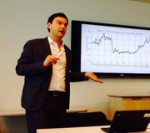
The evolution of inequality, wealth and the prospects for economic growth – these were some of the topics highlighted at the Development Policy Seminar arranged on 16 April by UN DESA’s Development Policy Analysis Division with Professor Thomas Piketty presenting his volume “Capital in the Twenty-First Century” recently published by Harvard University Press.
Based on 15 years of research into the historical dynamics of wealth and income, Thomas Piketty, Professor of Economics at the Paris School of Economics, addressed questions about the long-term evolution of inequality, the concentration of wealth, and the prospects for economic growth. He showed the “world top incomes database”, presently containing data from 27 countries, illustrating that incomes around the median have been stagnant in many countries, including the US, while the top 10% sharply increased their share of total income since 1980.
Focusing on the long-term evolution of capital, income ratios and wealth concentration, Professor Piketty highlighted three major points in his presentation – the return of a patrimonial or wealth-based society in the Old World (Europe, Japan), the future of wealth concentration and inequality in America.
“Wealth-income ratios seem to be returning to very high levels in low growth countries. […] In the very long run, this can be relevant for the entire world,” he pointed out. “Since the 1970s, income inequality has increased significantly in the rich countries, including in Europe and the US,” Professor Piketty said. He also stressed the importance of identifying whether the increase of inequality is based more upon extreme differences in labor income or whether it is driven by wealth concentration. “If the question of inequality is to become central, we must begin by gathering an extensive set of historical data,” he explained.
The main driver of inequality – the tendency of returns on capital to exceed the rate of economic growth – today threatens to generate extreme disparities that are likely to stir discontent and undermine democratic values. This is something that Professor Piketty highlights in the final part of his book. He proposes to address this with a “social state” for the 21st century, a rethinking of progressive income taxes and a global tax on capital.
Professor Piketty specializes in the study of economic inequality at the Paris School of Economics. The translation of his book, published by Harvard University Press in February 2014 is available at the UN Bookshop.
